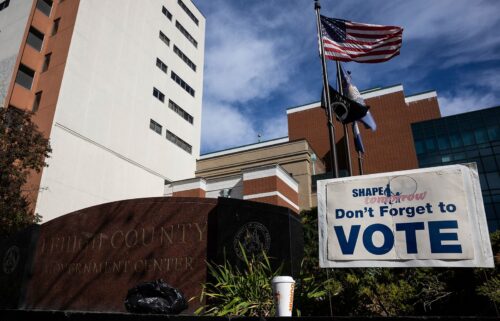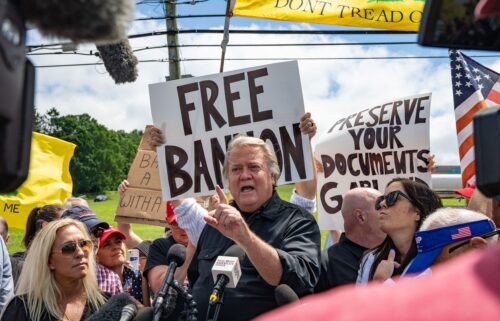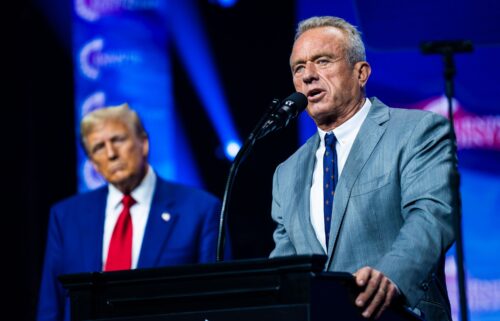‘Keep talking’: How a simple philosophy helped lead to a White House celebration

By Phil Mattingly, CNN
Steve Ricchetti never stopped talking to Joe Manchin.
Even as the negotiations over President Joe Biden’s cornerstone economic and climate legislation came to be defined by high-profile meltdowns, there was simply too much at stake to allow a rupture in the relationship with the West Virginia senator.
The day after Manchin went on Fox and appeared to drive a stake into the heart of Biden’s sweeping proposal, Ricchetti — one of Biden’s closest and longest serving aides — was back on the phone with him.
When news hit in mid-July that appeared to show Manchin had pulled the plug on resuscitated talks over a pared back version of the proposal, Ricchetti was on the phone with him a few hours later.
After receiving word directly from Manchin that things weren’t nearly as dire as they’d been presented, the calls between the two would continue four of the next five days, as the secret negotiations between Manchin and Senate Majority Leader Chuck Schumer continued.
The proposal that Washington forecasters had once again marked for dead would end in a deal — one that stunned many in the White House and some of Schumer’s closest allies.
“What gets lost in the kind of daily hyperventilation or scrutiny of the process, is that no matter what — good or bad — you always pick up the phone the next day and keep talking,” Ricchetti told CNN in an interview.
The prolonged negotiations underscored the reality of thread-bare majorities in the House and, most acutely, the Senate. For a White House that had an extensive to-do list in 2022 — including a confirmation of a Supreme Court nominee, a major spending agreement and a series of bipartisan bills that had momentum — alienating a single vote wasn’t a viable option.
The calls — and quiet persistence — are emblematic of an approach that helped pull a White House faced with cratering poll numbers and questions about Biden’s future to a moment in which Democrats feel an unlikely surge of momentum leading into the midterm elections.
Officials view the Inflation Reduction Act, which will be celebrated at the White House on Tuesday, as a critical piece of evidence for what has long been Biden’s theory of the case: That his approach, though at times viewed as a relic of a political time that no longer exists, can, in fact, work.
The President’s party still faces political headwinds. History doesn’t look kindly on a president’s first midterm election, particularly one whose party has control of both chambers of Congress. Economic concerns remain high amid inflation that, while showing signs of easing, remains at four-decade highs. Republicans have attacked Biden’s signature legislative achievement as a sweeping spending proposal that will only serve to accelerate that effect.
A long-awaited White House celebration
The bill, signed into law in August, will receive its long-awaited South Lawn celebration on Tuesday. It’s a moment White House officials have carefully planned to highlight the sweeping nature of a bill that addresses Democratic priorities on prescription drugs, health care and climate change that have long been out of reach.
The White House is planning for “thousands” of guests, including lawmakers, Cabinet secretaries, governors and mayors. Biden’s message will also track closely with a more aggressive tone toward Republicans that he’s adopted in recent weeks, one that seeks to emphasize the united GOP opposition to the legislation, according to a White House official.
The celebration will serve as a capstone to a remarkable period of legislative success for Biden, one that included two bipartisan laws — a $280 billion manufacturing and science package and a law designed to dramatically expand health care to veterans fighting diseases linked to toxic burn pit exposure in Iraq and Afghanistan.
For Biden’s team, the accomplishments marked a culmination of more than 18 months of work and building relationship. White House chief of staff Ron Klain was regularly on the phone with Schumer. Louisa Terrell, Biden’s legislative affairs chief, quarterbacked the operation and served as Capitol Hill’s key liaison for a myriad of issues — whether technical, political or parochial — that animated individual lawmakers engaged in the process.
Biden’s National Economic Council Director Brian Deese served as the critical policy negotiator for Biden’s team, as proposals were revised and tweaked in real-time to secure votes.
The overall approach had at times drawn criticism, particularly from the more moderate wing of the party, for being too attentive to the weight of the substantial progressive voices inside the House and Senate Democratic caucuses.
But the summer wins — along with the first major gun law in three decades, the $1 trillion bipartisan infrastructure law and the party-line $1.9 trillion American Recovery Act — represent a substantial record of legislative success that Biden has eagerly highlighted in events around the country. Some of the most endangered front-line Democrats, long agitating for the White House to pare back its ambitions to secure legislative success, have followed suit.
“The American people should have confidence that we are on the right track, that we’re seeing real progress,” Biden said Monday as he ticked through his legislative record at an event in Boston, highlighting the infrastructure law.
Doing whatever it takes — even ziplining
It was at Biden’s direction that Ricchetti ensured lines of communication with Manchin remained open. As frustration that bordered on bitterness grew inside the West Wing about the West Virginian’s process and decision making, it was the President who made clear it was a process that required White House officials to step back — one that would give the chamber Biden called home for 36 years the space to work on its own.
“At some point, the late-night Oval Office meetings and ‘will he, won’t he’ becomes extremely counterproductive,” a Democratic senator told CNN of the moments that defined the first year of negotiations over the Biden’s proposal. “(Biden) got that — and that’s not insignificant.”
Nor is it insignificant that Manchin’s approach, despite the frustration it could draw from even some of his own colleagues, never fully closed the door to a deal — and didn’t include holding grudges despite clear tensions between the critical Democratic vote and White House staff. Klain, who had become a target of Manchin’s private ire, had a private dinner with Manchin as talks started to kick back into gear.
Still, Manchin made clear his negotiations weren’t with Biden, nor were they with White House staff. Biden’s team would play a central role in assisting on the technical and policy details, but Biden would not be a central player. That was both a necessity, and by design.
“He knew precisely when to step in and when to let negotiations play out,” Schumer said of Biden’s approach during the August bill signing ceremony.
For the White House, the moment became about creating conditions for an agreement. With Biden no longer taking the lead on the talks and deferring to senators, Schumer in particular, the approach was focused on ensuring nothing would topple any progress.
Cabinet officials kept in regular touch with Manchin about his priorities outside the bill. Administration made pilgrimages to West Virginia to highlight various priorities. Deese, who primarily served as a key contact for Manchin’s staff, went ziplining with Manchin near the New River Gorge.
Environmental actions across the administration were viewed through lens of not unsettling Manchin. The West Virginian never asked explicitly for the administration to hold off on taking certain actions in exchange for his vote, but officials were keenly aware of his priorities.
They took the view that the historic climate provisions in an eventual deal would far outweigh any near-term concerns on the regulatory side, officials said. That included proposals that had been drafted and were ready to deploy when it appeared talks had once again fallen apart in the middle of July.
But as Biden appeared to be moving toward declaring a national emergency over climate change, he stopped short. Unbeknownst to most anyone, talks between Schumer and Manchin had re-started.
‘I never had a doubt’
That Ricchetti would run point for Biden on keeping conversations alive is as natural as it is fitting. A long-time Washington hand with significant legislative experience as an aide to President Bill Clinton, as a lobbyist and in Biden’s vice presidential office, Ricchetti quickly became indispensable to the President’s legislative operations due to his relationships with Republicans and moderate Democrats.
But he and Biden were also just about the only two people inside the West Wing that saw a pathway to success on what became the $740 billion economic and climate package, officials acknowledge.
The process of bringing things back to life in the wake of the December implosion wasn’t immediate, nor was it a sure thing.
“We kept working on the things that were in front of us and stayed both in contact and in a respectful dialogue,” Ricchetti said. “And some time was also required to think through if there’s an avenue to really reengage on this — and what basket of things could be contained in it?”
The shape of the pared back legislation was in large part drafted in the initial iteration of the talks — prescription drug reform and Affordable Care Act subsidies were largely done. The climate package was also roughly sketched out, as were tax changes to finance the approach. Critically, given Manchin’s strident concerns about the inflation and the deficit, the financing would include billions in deficit reduction.
The overall approach, particularly on the environmental side, marked a window into what would become a critical agreement between Manchin, Schumer and the White House on a separate agreement to move legislation to reform the permitting process for energy projects.
Despite objections from dozens of House Democrats to include the bill on must-pass government funding legislation, the White House has never wavered on its full-throated endorsement of the proposal.
White House officials are continuing to work to clear the pathway for the proposal.
As for Biden, the self-proclaimed “congenital optimist” had many of his own questions about the pathway for an agreement at the start of this year, according to two people who spoke to him at the time.
But as he signed the bill into law last month, he wasn’t above having some fun with the senator who ended up turning what appeared to a long-shot ambition into reality.
“Joe,” Biden said as he addressed Manchin during the signing ceremony. “I never had a doubt.”
The-CNN-Wire
™ & © 2022 Cable News Network, Inc., a Warner Bros. Discovery Company. All rights reserved.



